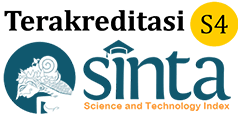DUALISME IDEOLOGI DALAM IDENTITAS SPIRITUAL KOMUNITAS BHUJANGGA DI BALI
DOI:
https://doi.org/10.30742/juispol.v3i1.2891Abstract
This paper presents a critical study of ideological aspects of identity in the spirituality of society as reflected through phenomena in the realm of the Bhujangga community in Bali. In this case, the spiritual identity of the community identifies a dualism related to the legitimacy of the Vaishnava ideology through the formal institutional authority of kinship, which tends to be contradictory to the inheritance of a number of Siwaistic markers such as being verified and affiliated with the Bhujangga ideology. In line with this phenomenon, this study focuses on a discussion of constructivity and correlativity related to ideological dualism in the spiritual identity of the Bhujangga community. This study was conducted through descriptive and interpretive methods based on a number of concepts from the semiotic theory of cultural interpretation by Geertz and critical discourse theory by Foucault. The results of this study indicate that the constructivity of ideological dualism in the spiritual identity of the Bhujangga community is related to (1) cognitive identity and (2) collective identity. Meanwhile, the correlativity of ideological dualism in the spiritual identity of the Bhujangga community is related to (1) the domination of the Vaishnava ideology and (2) the degradation of the Bhujangga ideology.
Keyword: Vaishnava ideology, Bhujangga ideology, Bhujangga community
References
Foucault, Michel. 1997. Disiplin Tubuh: Bengkel Individu Modern. Penyadur: Petrus Sunu Hardiyanta. Yogyakarta: LKiS.
. 2011. Pengetahuan & Metode Karya-karya Penting Foucault. Penterjemah: Arief. Yogyakarta: Jalasutra.
. 2012. Arkeologi Pengetahuan. Penterjemah: Inyiak Ridwan Muzir. Yogyakarta: ORCiSod.
Geertz, Clifford. 1992. Tafsir Kebudayaan. Penterjemah: Francisco Budi Hardiman. Yogyakarta: Penerbit Kanisius.
Ginarsa, Ketut dkk. 2014. Bhujangga Dharma. Denpasar: Moncol Pusat Maha Warga Bhujangga Waisnawa.
Goris, R. 1974. Sekte-sekte di Bali. Penterjemah: Ny. P.S. Kusumo Sutojo. Jakarta: Bhratara.
Koentjaraningrat. 1977. Kebudayaan, Mentalitas dan Pembangunan. Jakarta: PT. Gramedia Pustaka Utama.
Moleong, Lexy J. 2002. Metodelogi Penelitian Kualitatif. Bandung: Remaja Rosdakarya.
Sunarya, I Nyoman dkk. 2015. “Paham Bhujangga Dalam Dinamika Sosial Budaya Bali: Sebuah Pengantar Singkat†(makalah). Denpasar: Griya Batur Buah Gunung Ratha Kesiman, Griya Batur Tembau, dan Griya Batur Paguyangan.
. 2019. “Penelitian Hidro-Arkeologi DAS Pakerisan-Petanu Kabupaten Gianyar: Kajian Terhadap Pola Penempatan Bangunan Suci†(Laporan Penelitian). Denpasar: Balai Arkeologi Bali.
Wisnu, I Wayan Gede. 2016. “The Existence of Bhujanggaism in Bali: A Case Study in The Customary Village of Kesiman†(makalah). Dalam Southeast Asian Thinkshop: The Question of World Culture. Editor: I Ketut Ardhana, dkk. Denpasar: Center of Bali Studies. Hal 227-236
.2017. “The Dominant Discourse and Marginalize Discourse in the Legend of Dongkang Kuning Matindik Mas in the Customary Village of Kesiman†(makalah). Dalam International Conference Global Connectivity Cross Cultural Connections, Social Inclusion, and Recognition: The Role of Social
Sciences. Denpasar: Warmadewa University Press. Hal 325-334
. 2022. “Pergulatan Ideologi Bhujangga di Kota Denpasar- Bali†(disertasi). Denpasar: Universitas Udayana





